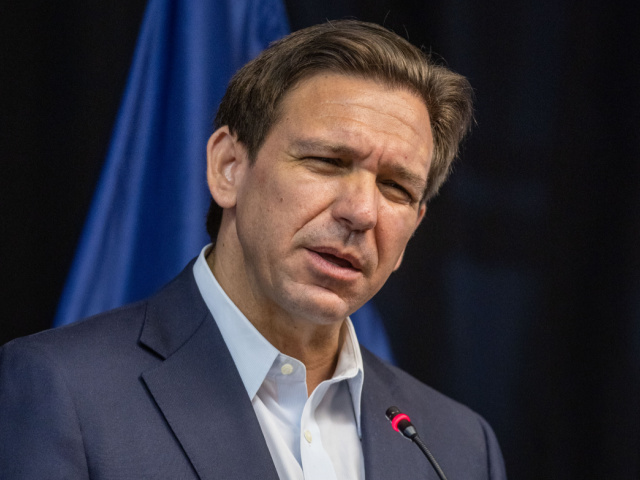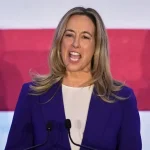
A New York Times report published Saturday detailed how Gov. Ron DeSantis’s (R-FL) presidential campaign lost the online war to former President Donald Trump, which has coincided with his drop in the polls.
DeSantis’s camp attempted to organize an online eco-system of prominent conservative influencers to lead the charge against prominent pro-Trump influencers and the 45th president’s campaign on social media in May at a secret meeting at the home of a DeSantis pollster, the New York Times first reported Saturday.
The event backfired and “had the opposite effect” on some of the twelve or so prominent influencers there who admired DeSantis, three people who were at the meeting told the Times, according to politics reporter Ken Bensinger and campaign reporter Nicholas Nehamas.
“Some of the guests at the meeting, which has not previously been reported, left doubtful that the DeSantis camp knew what it was in for,” they wrote.
Weeks after the meeting, DeSantis and his team opted to formally launch his campaign through a Twitter Space with the company’s owner, Elon Musk, and entrepreneur David Sacks, which, as Breitbart News reported, was marred by technical difficulties:
The Twitter Spaces call, scheduled to launch at 6 p.m. Eastern, began several minutes late as one unidentified voice whispered that it was “quiet.” David Sacks, the entrepreneur hosting the event, began to introduce Elon Musk and asserted that this was “historic” before the audio cut out. From then on, the audio continued to cut in out several times, with continued echoing and seemingly random voices — not the voice of the governor, whom the conversation was all about.
DeSantis was quickly trolled by Republicans and Democrats alike after the space was shut down amid technical problems that forced the three men to launch a new space on the platform,” as Breitbart News documented.
It seems we broke the internet with so much excitement…
While you’re waiting, donate NOW ⬇️https://t.co/TjACzTBHHG
— Team DeSantis (@TeamDeSantis) May 24, 2023
The DeSantis campaign contended in a post that evening it “broke the internet,” and three sources at a meeting the next day said then-campaign manager Generra Peck doubled down on the narrative, leaving them perplexed, as they perceived it as disastrous, according to Saturday’s report.
With seemingly failed efforts to win over some of the best influencers on the right, according to the Times, the DeSantis campaign charged onward using the DeSantis War Room X account, the campaign’s Rapid Response Director Christina Pushaw’s account, and some influencers who enlisted in the DeSantis Army.
Yet the social media warfare has largely fallen flat, with the campaign being described by the Times on Saturday as having “a reputation for being thin-skinned and mean-spirited.”

LACONIA, NEW HAMPSHIRE – JUNE 1: Republican presidential candidate Florida Gov. Ron DeSantis delivers remarks during his “Our Great American Comeback” Tour stop on June 1, 2023 in Laconia, New Hampshire. DeSantis is in New Hampshire as part of his newly launched presidential campaign and after spending two days making stops around Iowa, which leads off the GOP presidential primary contest next year. (Photo by Scott Eisen/Getty Images)
Another inflection point for team DeSantis that the Times pointed to came in April, ahead of the meeting, when the MAGA Inc. political action committee (PAC), which supports Trump, launched an early $1.5 million attack ad entitled “Pudding Fingers,” in reference to an unverified report, which DeSantis has denied, asserting he once ate chocolate pudding with his fingers.
“Ron DeSantis loves sticking his fingers where they don’t belong. And we’re not just talking pudding,” the ad reads. “DeSantis has his dirty fingers all over Senior entitlements — Like cutting Medicare — slashing Social Security — Even raising our retirement age.”
As the Times notes, the hashtag “#puddingfingers” remains relevant on Twitter, with the Iowa caucuses less than 100 days away, despite his team and surrogates’ attempts to dismiss the outlandish content of the rumors. He has been peppered by pro-Trump influencers on other fronts, as well, throughout his candidacy.
Pushaw slammed the Times article in a tweet Saturday.
The corporate media loves that Trump prioritizes winning meme wars over defeating the Left. Because they know that next time BLM decides to burn down our cities, Trump will just tweet LAW & ORDER a dozen times like he did before, thinking the internet is real life. https://t.co/m5FQZFC40t
— Christina Pushaw 🐊 🇺🇸 (@ChristinaPushaw) October 21, 2023
“The corporate media loves that Trump prioritizes winning meme wars over defeating the Left,” she wrote. “Because they know that next time BLM decides to burn down our cities, Trump will just tweet LAW & ORDER a dozen times like he did before, thinking the internet is real life.”
The effort of the Florida governor to take on Trump, who defined how social media can be used to win primaries and elections in 2016 with his uncanny knack for Twitter, has coincided with DeSantis’s severe drop in the polls.
On March 31, the Real Clear Politics (RCP) polling average showed DeSantis as Trump’s clear-cut top challenger. He registered at 30 percent, just 16 points back of the 45th president at 46 percent. Days later, Trump was indicted for the first time by New York District Attorney Alvin Bragg’s office, rallying support behind him.
Despite three subsequent indictments of Trump, all of which have been criticized in some fashion by legal experts, the gap between the two candidates has only furthered. As of October 20, Trump registered at 59 percent of RCP’s polling average. DeSantis sits at 13 percent with the rest of the pack, topped by former Gov. Nikki Haley (R-SC) at seven percent, inching closer and closer in the poll aggregator’s average.







